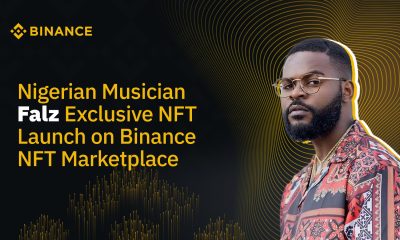In this week’s news roundup, you’ll read about Quidax joining the Bored Ape Yacht Club after purchasing a Bored Ape NFT worth 75.2 ETH, Nigeria-based African Blockchain Lab closing a pre-series A funding round worth $6 million to launch a crypto wallet, and other top crypto stories.
Quidax Buys NFT Worth 75.2 ETH to Join the Bored Ape Yacht Club
Quidax has become the first African crypto trading platform to join the Bored Ape Yacht Club after purchasing an NFT worth 75.2 ETH.
The Bored Ape Yacht Club (BAYC), which has grown to become one of the most prominent brands in the NFT space, is a collection of 10,000 ape avatars on the Ethereum blockchain and individually act as tickets to an online social club. So far, BAYC NFTs have generated over $1 billion in total sales.
The Bored Ape Yacht NFT purchased by the crypto trading platform was worth $273,252.5, an equivalent of 75.2 ETH at an exchange rate of $3,769 per 1 ETH. Additionally, owning a Bored Ape NFT will provide Quidax with access to various activities with one of them being ‘The Bathroom’, which is a collaborative graffiti board.
African Blockchain Lab Raises $6 Million Funding to Launch Crypto Wallet
Nigeria-based African Blockchain Lab has successfully raised a pre-series A funding round worth $6 million to help fund the launch of VIBRA, a crypto wallet.
As reported in Disrupt Africa, the funding round was co-led by a combination of global investors, including well-known African venture capital firms CRE Venture Capital, Lateral Frontiers VC, and Musha Ventures. Additionally, the blockchain startup also received funding from international blockchain investors Bonfire, Cadenza Capital, Dragonfly Capital, Despace, Fenbushi, Hash Global, Hashkey Capital, Head & Shoulder X, LeadBlock, Kryptial, SNZ Capital, among others.
“African Blockchain Lab was founded with a singular mission – to drive the mass adoption of digital assets and blockchain technologies in Africa. With the backing from our strategic investors, we intend to bring world-class tech stacks, projects and innovation to the African continent, starting with our first product VIBRA,” said Vincent Li, the Co-founder for African Blockchain Lab.
The funding will enable African Blockchain Lab to launch VIBRA, its crypto wallet, and add new features such as VIBRA Earn, a crypto saving product that will allow users to earn interest on various crypto assets.
Speaking on the funding, Pardon Makumbe, the Managing Partner at CRE Venture Capital, said, “We believe Africa has a generational opportunity to build a more collaborative and inclusive financial ecosystem using decentralized technologies, in which all players are winners. We are excited to partner with the world-class team at Vibra to make this happen.
Airbnb Might Offer Users Crypto Payment as an Option After Crypto Payment Tops User Requests
Airbnb Inc., a home rental firm, might soon join the growing list of businesses accepting digital currencies as payment options for services.
This comes after Brian Chesky, Airbnb’s CEO and Co-Founder, asked users on Twitter to give suggestions of anything they’d like the firm to launch in 2022. After sifting through 4,000 responses, Chesky posted the top six suggestions. The number one suggestion requested by most users was the ability to book and pay for an Airbnb accommodation using cryptocurrencies. Other recommendations included clear pricing displays, guest loyalty programme, updated cleaning fees, more long-term stays and discounts, and better customer service. Chesky went ahead to reveal that some of the suggestions were already in the pipeline and that what wasn’t already in the pipeline would be considered.
While Chesky did not explicitly reveal whether his company would add crypto payments, his comment could mean that either they are already looking to incorporate virtual currencies into their services or they will be considering it.
NFT Marketplace, OpenSea, Raises $300 Million in Series C Funding at a Valuation of $13.3 Billion
OpenSea, the largest NFT marketplace globally, on Tuesday announced a successful Series C funding round worth $300 million.
The funding round was led by investment firms Paradigm – a crypto-focused investment firm – and Coatue Management. Following the investment and four years, after it was launched, OpenSea’s current valuation stands at $13.3 billion.
The marketplace was founded in 2017 as a place for people to buy and sell non-fungible tokens (NFTs). OpenSea plans to use the funds to accelerate product development, significantly improve customer support and customer safety, meaningfully invest in the wider NFT and Web3 community, as well as grow their team.
To learn more about Bitcoin, download the Bitcoin Beginner’s Handbook for free.


 Features3 years ago
Features3 years ago
 Bitcoin2 years ago
Bitcoin2 years ago
 Features3 years ago
Features3 years ago
 Features3 years ago
Features3 years ago
 Features3 years ago
Features3 years ago
 Features3 years ago
Features3 years ago
 Features8 months ago
Features8 months ago
 Bitcoin10 months ago
Bitcoin10 months ago


















 Central African Republic (CAR) has set up a 15-member committee that will be responsible for developing a bill on the use of cryptocurrencies and tokenization in the region.
Central African Republic (CAR) has set up a 15-member committee that will be responsible for developing a bill on the use of cryptocurrencies and tokenization in the region.
